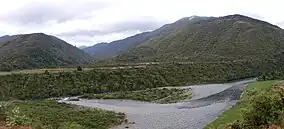Ōtaki Forks
Ōtaki Forks is a rural locality in the Kāpiti Coast District of the Wellington Region of New Zealand's North Island. It is located at the confluence of the Ōtaki River with its tributaries Waiotauru River and Waitatapia River. It is 18 km southeast of Ōtaki by road.[3] It is the major entrance to the Tararua Forest Park from the west.[4]
Ōtaki Forks | |
|---|---|
Rural locality | |
 The Ōtaki river before it joins at Ōtaki Forks with the Waiotauru and Waitatapia rivers | |
| Coordinates: 40.868°S 175.235°E | |
| Country | New Zealand |
| Region | Wellington Region |
| Territorial authority | Kāpiti Coast District |
| Ward |
|
| Community |
|
| Electorates | |
| Government | |
| • Territorial Authority | Kāpiti Coast District Council |
| • Regional council | Greater Wellington Regional Council |
| • Kāpiti Coast Mayor | Janet Holborow |
| • Ōtaki MP | Tim Costley |
| • Te Tai Hauāuru MP | Debbie Ngarewa-Packer |
| Area | |
| • Total | 87.26 km2 (33.69 sq mi) |
| Population (June 2023)[2] | |
| • Total | 880 |
| • Density | 10/km2 (26/sq mi) |
Seed & O'Brien's steam-powered sawmill at Sheridan Creek, which operated from 1930 to 1938, has been partially restored. It was closed by a flood which destroyed bridges.[5]
Demographics
The statistical area of Ōtaki Forks, which also includes Hautere, covers 87.26 km2 (33.69 sq mi),[1]. It had an estimated population of 880 as of June 2023, with a population density of 10.08 people per km2.
| Year | Pop. | ±% p.a. |
|---|---|---|
| 2006 | 660 | — |
| 2013 | 717 | +1.19% |
| 2018 | 777 | +1.62% |
| Source: [6] | ||
Ōtaki Forks had a population of 777 at the 2018 New Zealand census, an increase of 60 people (8.4%) since the 2013 census, and an increase of 117 people (17.7%) since the 2006 census. There were 297 households, comprising 393 males and 384 females, giving a sex ratio of 1.02 males per female. The median age was 50.0 years (compared with 37.4 years nationally), with 123 people (15.8%) aged under 15 years, 102 (13.1%) aged 15 to 29, 381 (49.0%) aged 30 to 64, and 171 (22.0%) aged 65 or older.
Ethnicities were 91.1% European/Pākehā, 8.5% Māori, 1.5% Pasifika, 1.9% Asian, and 4.6% other ethnicities. People may identify with more than one ethnicity.
The percentage of people born overseas was 21.6, compared with 27.1% nationally.
Although some people chose not to answer the census's question about religious affiliation, 55.6% had no religion, 33.6% were Christian, 1.2% were Buddhist and 1.9% had other religions.
Of those at least 15 years old, 195 (29.8%) people had a bachelor's or higher degree, and 78 (11.9%) people had no formal qualifications. The median income was $34,500, compared with $31,800 nationally. 156 people (23.9%) earned over $70,000 compared to 17.2% nationally. The employment status of those at least 15 was that 315 (48.2%) people were employed full-time, 126 (19.3%) were part-time, and 12 (1.8%) were unemployed.[6]
References
- "ArcGIS Web Application". statsnz.maps.arcgis.com. Retrieved 21 May 2021.
- "Population estimate tables - NZ.Stat". Statistics New Zealand. Retrieved 25 October 2023.
- Otaki Forks, Wellington (Map).
- "Ōtaki Forks area - Getting there". Department of Conservation. Retrieved 21 May 2021.
- "Old Sawmill Restored - Volunteers sharpen skills at historic sawmilling site". Kāpiti and Coast Independent. 30 March 2012.
- "Statistical area 1 dataset for 2018 Census". Statistics New Zealand. March 2020. Ōtaki Forks (237700). 2018 Census place summary: Ōtaki Forks
External links
![]() Media related to Otaki Forks at Wikimedia Commons
Media related to Otaki Forks at Wikimedia Commons